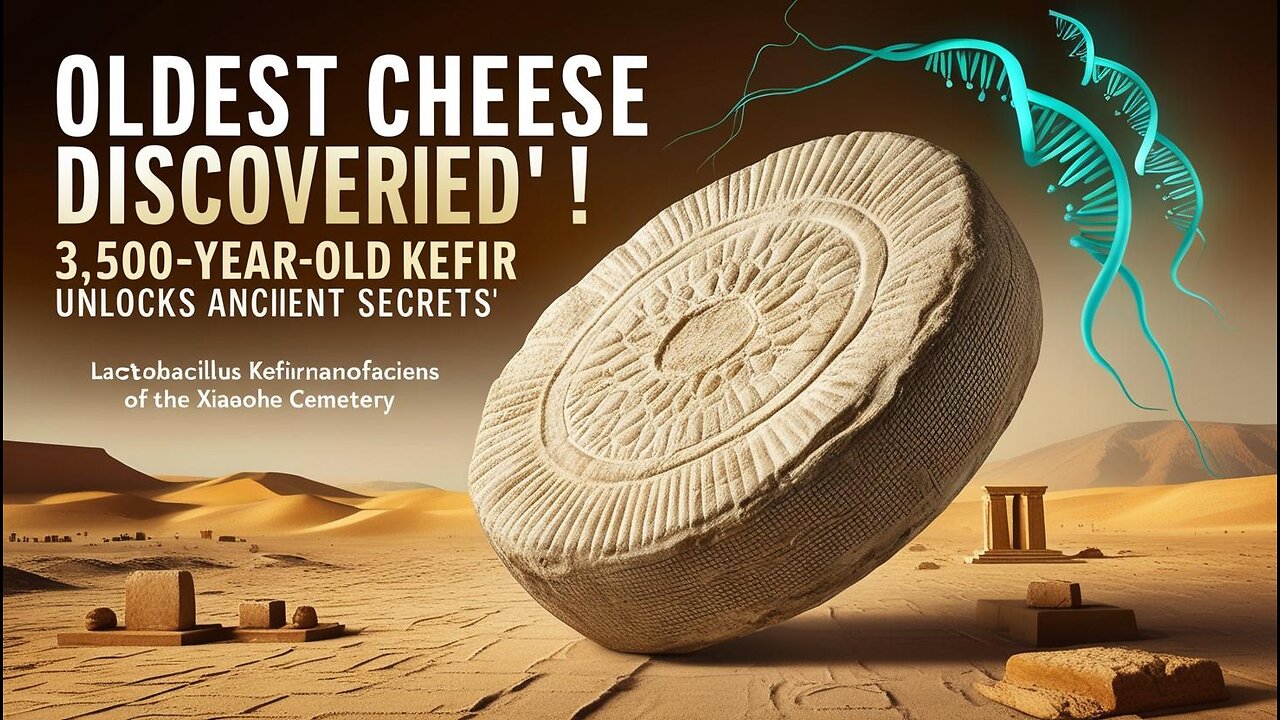Premium Only Content

World's Oldest Cheese Discovered: 3,500-Year-Old Kefir Unlocks Secrets of Ancient Diets
Uncovering the Oldest Cheese in History 🧀
A groundbreaking study has revealed the world’s oldest cheese—an ancient batch of kefir cheese dating back 3,500 years! This remarkable discovery from the Xiaohe Cemetery in China is shedding light on the evolution of fermented foods, microbial interactions, and ancient human diets. But what does this mean for our understanding of fermentation, cultural exchanges, and even microbial evolution?
Key Highlights:
Ancient Kefir Cheese: Discovered in the Tarim Basin of Xinjiang, China, this kefir cheese provides critical insights into ancient dietary practices. It was preserved for over 3,500 years, revealing unique details about the diets of Bronze Age people.
Microbial Evolution: DNA analysis uncovered the presence of Lactobacillus kefiranofaciens, a strain central to modern kefir, showing how microbes have evolved in response to human dietary habits over millennia.
Cultural Diffusion: The discovery challenges the long-held belief that kefir originated solely in the Caucasus region. It suggests that kefir culture may have spread from Xinjiang into East Asia, offering a fresh perspective on ancient trade and cultural exchanges.
The Role of Kefir in Ancient Health: The findings reveal how fermented dairy products like kefir helped shape human health through gut microbiota and probiotic bacteria, crucial for digestion, immunity, and overall wellness.
What’s in the Study?
By sequencing mitochondrial DNA from ancient cheese, scientists identified cow and goat milk as the key ingredients, revealing how these early societies used separate milk batches—a practice different from the typical blending method seen in ancient Middle Eastern and Greek cheese-making.
The study also shows how microbial evolution shaped the fermentation process, improving bacterial resilience and boosting health benefits over time.
What Does This Mean for the Future of Fermentation Science?
This discovery highlights the profound role fermented foods play in human history. By studying ancient dairy products, scientists are unearthing microbial history and learning how humans and microbes co-evolved to sustain healthier, stronger societies. The study even reveals that the ancient Lactobacillus strains found in kefir were genetically adapted to withstand harsh environments—offering a glimpse into how probiotic bacteria evolve to better serve their hosts.
The Global Impact:
The findings are reshaping how we view fermented foods, not just as nutritional staples, but as key players in the microbial ecosystems of ancient civilizations. The study also showcases the cutting-edge potential of modern DNA sequencing technologies to reconstruct the dietary practices and cultural exchanges of our distant ancestors.
🔍 What can we learn from our ancient ancestors’ fermentation practices? Could these findings unlock new ways to use probiotics for better health? Share your thoughts in the comments!
-
 1:03:41
1:03:41
Man in America
17 hours agoAre Trump & Musk the COUNTER-ELITES? w/ Derrick Broze
76.5K44 -
 3:45:08
3:45:08
DLDAfterDark
8 hours ago $9.75 earnedDLD Live! SHTF Handguns! Which Would You Choose?
41.9K2 -
 1:50:38
1:50:38
Mally_Mouse
11 hours agoSaturday Shenanigans!! - Let's Play: Mario Party Jamboree
52.2K -
 1:13:00
1:13:00
Patriots With Grit
15 hours agoWill Americans Rise Up? | Jeff Calhoun
43.1K13 -
 14:55
14:55
Exploring With Nug
15 hours ago $11.27 earnedWe Found Semi Truck Containers While Searching for Missing Man!
59.4K9 -
 27:57
27:57
MYLUNCHBREAK CHANNEL PAGE
22 hours agoOff Limits to the Public - Pt 3
133K66 -
 38:07
38:07
Michael Franzese
15 hours agoLeaving Organized Crime and Uncovering Mob in Politics: Tudor Dixon and Michael Franzese
106K15 -
 2:42:54
2:42:54
Jewels Jones Live ®
2 days agoAMERICA IS BACK | A Political Rendezvous - Ep. 111
83.6K50 -
 8:47:33
8:47:33
Due Dissidence
1 day agoLIVE: Workers Strike Back Conference ft. Chris Hedges, Jill Stein, Kshama Sawant, and More!
120K92 -
 8:36:37
8:36:37
Right Side Broadcasting Network
5 days agoLIVE REPLAY: CPAC 2025 Day Three with President Donald J. Trump - 2/22/25
467K104